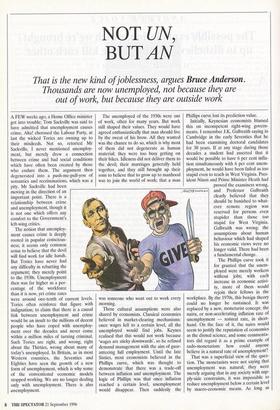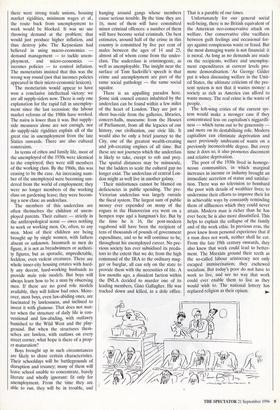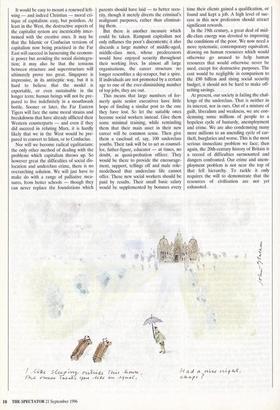NOT UN, BUT AN That is the new kind of
joblessness, argues Bruce Anderson. Thousands are now unemployed, not because they are out of work, but because they are outside work
The notion that unemploy- ment causes crime is deeply rooted in popular conscious- ness; it seems only common sense to believe that the devil will find work for idle hands. But Tories have never had any difficulty in rebutting the argument; they merely point to the 1930s. Unemployment then was far higher as a per- centage of the workforce than it is now, yet crime rates were around one-tenth of current levels. Tories often reinforce that figure with indignation; to claim that there is a causal link between unemployment and crime would be an insult to the millions of decent people who have coped with unemploy- ment over the decades and never come within a million miles of turning criminal. Such Tories are right, and wrong; right about the Thirties, wrong about many of today's unemployed. In Britain, as in most Western countries, the Seventies and Eighties have seen the growth of a new form of unemployment, which is why some of the conventional economic models stopped working. We are no longer dealing only with unemployment. There is also anemployment. The unemployed of the 1930s were out of work, often for many years. But work still shaped their values. They would have agreed enthusiastically that man should live by the sweat of his brow. All they wanted was the chance to do so, which is why most of them did not degenerate as human material; they were too busy getting on their bikes. Idleness did not deliver them to the devil; their marriages generally held together, and they still brought up their sons to believe that to grow up to manhood was to join the world of work; that a man was someone who went out to work every morning.
These cultural assumptions were also shared by economists. Classical economics believed in market-clearing mechanisms: once wages fell to a certain level, all the unemployed would find jobs. Keynes realised that this would not work because `wages are sticky downwards', so he refined demand management with the aim of guar- anteeing full employment. Until the late Sixties, most economists believed in the Phillips curve, which was thought to demonstrate that there was a trade-off between inflation and unemployment. The logic of Phillips was that once inflation reached a certain level, unemployment would disappear. Then suddenly the Phillips curve lost its prediction value.
The Phillips curve took it for granted that the unem- ployed were merely workers without jobs; with each increase in economic activi- ty, more of them would rejoin their fellows in the workplace. By the 1970s, this benign theory could no longer be sustained. It was replaced by a new, monetarist concept: the nairu, or non-accelerating inflation rate of unemployment — natural rate, in short- hand. On the face of it, the nairu would seem to justify the reputation of economics as the dismal science, and some commenta- tors did regard it as a prime example of sado-monetarism: how could anyone believe in a natural rate of unemployment?
That was a superficial view of the ques- tion. The monetarists were not saying that unemployment was natural; they were merely arguing that in any society with sup- ply-side constraints, it was impossible to reduce unemployment below a certain level by macro-economic means. As long as there were strong trade unions, housing market rigidities, minimum wages et al., the route back from unemployment to work would be blocked. It was no use throwing demand at the problem; that would just produce higher inflation, and thus destroy jobs. The Keynesians had believed in using macro-economics demand management — to tackle unem- ployment, and micro-economics incomes policies — to control inflation. The monetarists insisted that this was the wrong way round (not that incomes policies appeared in their micro-economic lexicon).
The monetarists would appear to have won a conclusive intellectual victory: we are all supply-siders now. There is only one explanation for the rapid fall in unemploy- ment since the last recession: the labour market reforms of the 1980s have worked. The nairu is lower than it was. But supply- side measures alone are not enough, nor do supply-side rigidities explain all of the great rise in unemployment from the late Sixties onwards. There are also cultural constraints.
In terms of ethos and family life, most of the unemployed of the 1930s were identical to the employed; they were still members of the working class. By the 1960s, this was ceasing to be the case. An increasing num- ber of the unemployed were becoming sun- dered from the world of employment; they were no longer members of the working class on gardening leave; they were becom- ing a new class: an underclass.
The members of this underclass are often themselves the children of unem- ployed parents. Their culture — strictly in the anthropological sense — owes nothing to work or working men. Or, often, to any men. Most of their children are being brought up by single women, with fathers absent or unknown. Inasmuch as men do figure, it is not as breadwinners or authori- ty, figures, but as sporadic, unpredictable, feckless, even violent creatures. There are whole inner-city housing estates with hard- ly any decent, hard-working husbands to provide male role models. But boys will always learn how to be a man by observing men. If there are no good role models available, they will follow bad ones. More- over, most boys, even law-abiding ones, are fascinated by lawlessness, and inclined to invest it with glamour. That does not mat- ter when the structure of daily life is con- ventional and law-abiding, with outlawry banished to the Wild West and the play- ground. But when the structures them- selves are lawless, with outlaws on every street corner, what hope is there of a prop- er maturation?
Boys brought up in such circumstances are likely to share certain characteristics. Their schooldays will be battlegrounds of disruption and truancy; many of them will leave school unable to concentrate, barely literate and wholly ignorant: fit only for anemployment. From the time they are able to run, they will be in trouble, and hanging around gangs whose members cause serious trouble. By the time they are 16, most of them will have committed minor criminal offences: a number of them will have become serial criminals. On best estimates, around half of the crime in this country is committed by five per cent of males between the ages of 14 and 25, almost all of whom come from the under- class. The underclass is criminogenic, as well as anemployable. The insight near the surface of Tom Sackville's speech is that crime and anemployment are part of the same social pathology — the same social squalor.
There is an appalling paradox here. Some sink council estates inhabited by the underclass can be found within a few miles of the heart of London. They are just a short bus-ride from the galleries, libraries, concert-halls, museums: from the Houses of Parliament, from all the legacies of our history, our civilisation, our civic life. It would also be only a brief journey to the City, one of the greatest wealth-creating and job-creating engines of all time. But these are not journeys which the underclass is likely to take, except to rob and prey. The spatial distances may be minuscule, but the ladders to scale the cultural gap no longer exist. The underclass of central Lon- don might as well live in another galaxy.
Their misfortunes cannot be blamed on deficiencies in public spending. The pre- Victorian underclass was largely outside the fiscal system. The largest sum of public money ever expended on many of the rogues in the Hanoverian era went on a hempen rope agd a hangman's fee. But by the time he is 16, the post-modern vagabond will have been the recipient of tens of thousands of pounds of government expenditure, and so he will continue to be, throughout his anemployed career. No pre- vious society has ever subsidised its preda- tors to the extent that we do; from the high command of the IRA to the ordinary mug- ger or 6urglar, all can rely on the state to provide them with the necessities of life. A few months ago, a dissident faction within the INLA decided to murder one of its leading members, Gino Gallagher. He was tracked down and killed, in a dole office. That is a parable of our times.
Unfortunately for our general social well-being, there is no British equivalent of the American neo-conservative attack on welfare. Our conservative elite vacillates between guilt feelings and occasional for- ays against conspicuous waste or fraud. But the most damaging waste is not financial: it is moral. As long as no demands are made on the recipients, welfare and unemploy- ment expenditures at current levels pro- mote demoralisation. As George Gilder put it when discussing welfare in the Unit- ed States, the ultimate criticism of the pre- sent system is not that it wastes money: a society as rich as America can afford to waste money. The real crime is the waste of people.
The left-wing critics of the current sys- tem would make a stronger case if they concentrated less on capitalism's niggardli- ness — which turns out to be generosity and more on its destabilising role. Modern capitalism can eliminate deprivation and meet previously undreamt-of wants on a previously inconceivable degree. But every time it does so, it also promotes discontent and relative deprivation.
The poor of the 1930s lived in homoge- neous communities, in which marginal increases in income or industry brought an immediate accretion of status and satisfac- tion. There was no television to bombard the poor with details of wealthier lives; to undermine their efforts to improve their lot in achievable ways by constantly reminding them of effluences which they could never attain. Modern man is richer than he has ever been;'he is also more dissatisfied. This helps to explain the collapse of the family and of the work ethic. In previous eras, the poor knew from personal experience that if a man does not work, neither shall he eat. From the late 19th century onwards, they also knew that work could lead to better- ment. The Marxists ground their teeth as the so-called labour aristocracy not only escaped immiserisation; they eschewed socialism. But today's poor do not have to work to live, and see no way that work could ever enable them to live as they would wish to. The national lottery has replaced religion as their opium.
It would be easy to mount a renewed left- wing — and indeed Christian — moral cri- tique of capitalism: easy, but pointless. At least in the West, the destructive aspects of the capitalist system are inextricably inter- twined with the creative ones. It may be that the Islamic or Confucian versions of capitalism now being practised in the Far East will succeed in harnessing the econom- ic power but avoiding the social disintegra- tion; it may also be that the tensions between structure and superstructure will ultimately prove too great. Singapore is impressive, in its antiseptic way, but it is hard to believe that the model is exportable, or even sustainable in the longer term; human beings will not be pre- pared to live indefinitely in a mouthwash bottle. Sooner or later, the Far Eastern Tigers will face the same moral strains and breakdowns that have already afflicted their Western counterparts — and even if they did succeed in refuting Man, it is hardly likely that we in the West would be pre- pared to convert to Islam, or to Confucius.
Nor will we become radical egalitarians: the only other method of dealing with the problems which capitalism throws up. So however great the difficulties of social dis- location and underclass crime, there is no overarching solution. We will just have to make do with a range of palliative mea- sures, from better schools — though they can never replace the foundations which parents should have laid — to better secu- rity, though it merely diverts the criminal's malignant purposes, rather than eliminat- ing them.
But there is another measure which could be taken. Rampant capitalism not only inflames the poor's discontents; it also discards a large number of middle-aged, middle-class men, whose predecessors would have enjoyed security throughout their working lives. In almost all large organisations, the career structure no longer resembles a sky-scraper, but a spire. If individuals are not promoted by a certain age to one of the ever-diminishing number of top jobs, they are out.
This means that large numbers of for- merly quite senior executives have little hope of finding a similar post to the one they have lost. So let the suitable ones become social workers instead. Give them some minimal training, while reminding them that their main asset in their new career will be common sense. Then give them a caseload of, say, 100 underclass youths. Their task will be to act as counsel- lor, father-figure, educator — at times, no doubt, as quasi-probation officer. They would be there to provide the encourage- ment, support, tellings off and male role- modelhood that underclass life cannot offer. These new social workers should be paid by results. Their small basic salary would be supplemented by bonuses every time their clients gained a qualification, or found and kept a job. A high level of suc- cess in this new profession should attract significant rewards.
In the 19th century, a great deal of mid- dle-class energy was devoted to improving the conditions of the poor. We now need a more systematic, contemporary equivalent, drawing on human resources which would otherwise go unused to help human resources that would otherwise never be used, except for destructive purposes. The cost would be negligible in comparison to the £90 billion and rising social security budget; it should not be hard to make off- setting savings.
At present, our society is failing the chal- lenge of the underclass. That is neither in its interest, nor in ours. Out of a mixture of guilt, liberalism and weakness, we are con- demning some millions of people to a hopeless cycle of bastardy, anemployment and crime. We are also condemning many more millions to an unending cycle of car- theft, burglaries and worse. This is the most serious immediate problem we face; then again, the 20th-century history of Britain is a record of difficulties surmounted and dangers confronted. Our crime and anem- ployment problem is not near the top of that fell hierarchy. To tackle it only requires the will to demonstrate that the resources of civilisation are not yet exhausted.




















































































 Previous page
Previous page